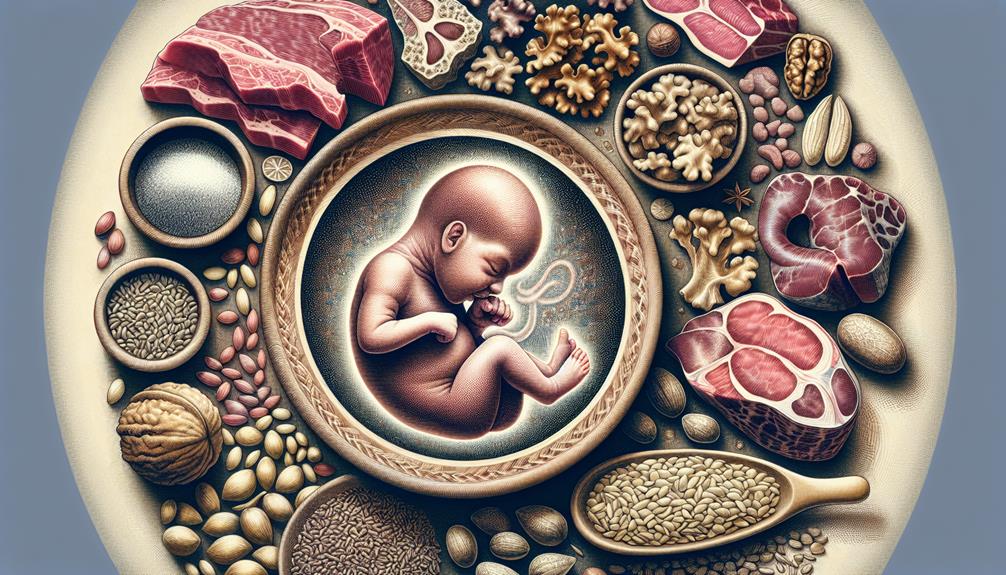







Prenatal vitamins, with nutrients like folic acid, iron, calcium, and vitamin D, help reduce birth defect risks by supporting healthy fetal development. They offer essential ingredients important for your baby's growth and minimizing deficiencies that may lead to complications. Ensuring you take these vitamins as recommended can contribute greatly to a successful pregnancy outcome. Prioritizing proper nutrition during pregnancy is key to infant well-being. Remember, the right nutrients can make a big difference in your baby's development.
Key Takeaways
- Prenatal vitamins containing folic acid reduce neural tube defects.
- Adequate iron intake prevents anemia in pregnant women.
- Omega-3 fatty acids support fetal brain development.
- Vitamin D is crucial for overall skeletal health.
- Proper nutrition reduces risks of common birth defects.
Importance of Prenatal Vitamins
Ensuring that you consume prenatal vitamins during pregnancy is essential for supporting your baby's healthy development and reducing the risk of birth defects. Prenatal vitamins contain essential nutrients like folic acid, iron, calcium, and vitamin D that are important for both you and your baby. These vitamins play a significant role in promoting proper nutrient absorption, which is necessary for fetal growth and development.
During pregnancy, your body's demand for nutrients increases to support the growth of the baby. Prenatal vitamins help bridge the gap between your dietary intake and the necessary nutrients needed for a healthy pregnancy. Adequate nutrient absorption is not only beneficial for your baby's development but also crucial for maintaining your own maternal health during this critical time.
Common Birth Defects
During pregnancy, certain birth defects can occur, potentially impacting the baby's health and development. Genetic testing plays an essential role in identifying inherited conditions such as Down syndrome, cystic fibrosis, or neural tube defects. Knowing about these conditions early on allows for better management and planning. While genetic factors play a significant role, maternal health and environmental factors also contribute to the risk of birth defects. Maintaining a healthy lifestyle, including proper nutrition, avoiding harmful substances like alcohol and tobacco, and managing chronic conditions like diabetes, can help reduce the likelihood of certain birth defects. Additionally, early prenatal care can help monitor the baby's growth and development, allowing for timely interventions if needed. Despite these preventive measures, some birth defects may still occur. However, being aware of common birth defects and risk factors empowers expectant parents to make informed decisions and seek appropriate support for their baby's health and well-being.
Nutrients in Prenatal Vitamins

When selecting prenatal vitamins, it is important to consider the key nutrients necessary for supporting maternal and fetal health during pregnancy. These vitamins should contain essential nutrients that help with proper nutrient absorption and promote overall maternal health. Key nutrients to look for in prenatal vitamins include folic acid, iron, calcium, vitamin D, omega-3 fatty acids, and iodine.
Folic acid is vital for preventing neural tube defects in babies, while iron helps prevent anemia in pregnant women. Calcium and vitamin D are critical for bone health, both for the mother and the developing baby. Omega-3 fatty acids play a role in fetal brain development, and iodine is necessary for thyroid function in both the mother and the fetus.
Ensuring that your prenatal vitamin contains these important nutrients is crucial for supporting a healthy pregnancy. Always consult with your healthcare provider to determine the most appropriate prenatal vitamin based on your individual needs. Remember, the quality and composition of prenatal vitamins can have a significant impact on maternal and fetal health outcomes.
Folic Acid and Neural Tube Defects
To understand the impact of folic acid on preventing neural tube defects, it is important to recognize its essential role in fetal development and health. Folic acid, a B vitamin, plays a critical role in DNA synthesis and repair, making it essential for the early stages of embryonic development. Neural tube defects, such as spina bifida and anencephaly, are severe birth abnormalities that occur within the first few weeks of pregnancy. Research has shown that adequate folic acid intake before and during pregnancy can greatly reduce the risk of these defects.
Maternal health is of utmost importance during pregnancy, and incorporating folic acid through dietary supplements or prenatal vitamins is a key component of prenatal care. Healthcare providers often recommend women of childbearing age to take folic acid daily to ensure ideal levels before conception. Genetic counseling can also play a role in identifying individuals at higher risk for neural tube defects, guiding them towards appropriate supplementation. By prioritizing maternal health and incorporating folic acid into prenatal care, the risk of neural tube defects can be significantly reduced.
Vitamin D and Bone Development
Enhancing bone development in infants and children, vitamin D plays a significant role in supporting overall skeletal health and strength. Adequate levels of vitamin D are vital for the absorption of calcium, a mineral essential for bone mineralization. Sun exposure is a primary source of vitamin D, as sunlight triggers its production in the skin. However, factors like geographical location, season, and sunscreen use can affect the body's ability to synthesize vitamin D effectively.
In growing children, vitamin D is particularly important for the development of strong and healthy bones. It helps regulate the growth plates, which are areas of cartilage at the ends of long bones where growth occurs. Insufficient vitamin D can lead to soft and brittle bones, increasing the risk of fractures and conditions like rickets.
Supplementation may be necessary in cases where sun exposure is limited, such as during winter months or in regions with little sunlight. Ensuring adequate vitamin D levels alongside a calcium-rich diet can support the best bone health in infants and children, promoting proper growth and reducing the risk of bone-related issues.
Iron and Preventing Anemia
Iron plays an essential role in preventing anemia by supporting the production of red blood cells. During pregnancy, the body's demand for iron increases to support the mother and the developing fetus. Iron absorption is critical during this time to prevent iron deficiency anemia, a condition that can lead to fatigue, weakness, and complications during pregnancy. Ensuring an adequate intake of iron-rich foods or iron supplements as recommended by healthcare providers is crucial for anemia prevention.
It's important to note that not all iron sources are created equal in terms of absorption. Heme iron, found in animal products like meat and poultry, is more readily absorbed by the body compared to non-heme iron found in plant-based sources. To enhance iron absorption, it's beneficial to consume vitamin C-rich foods alongside iron sources. This combination can help maximize the body's ability to absorb iron efficiently, further aiding in anemia prevention during pregnancy.
Omega-3 Fatty Acids for Brain Health

Omega-3 fatty acids are essential nutrients known for their role in supporting brain health and cognitive function. During pregnancy, these fatty acids play an important role in the cognitive development of the fetus. Docosahexaenoic acid (DHA), a type of omega-3 fatty acid, is particularly significant for the development of the baby's brain and eyes. Maternal health also benefits from omega-3 supplementation, as these fatty acids can help reduce the risk of preterm birth and support overall well-being during pregnancy.
Studies suggest that adequate intake of omega-3 fatty acids, especially DHA, during pregnancy may lead to improved cognitive function in children. Research has linked higher maternal DHA levels to better attention spans, problem-solving skills, and communication abilities in offspring. Hence, incorporating sources of omega-3 fatty acids into your diet or taking supplements can be beneficial not only for your baby's brain development but also for your own health during pregnancy. Consider speaking to your healthcare provider about the benefits of omega-3 supplementation to support brain health for both you and your baby.
Vitamin B12 and Red Blood Cells
Vitamin B12 plays an essential role in the production of red blood cells, supporting overall blood health and function. During pregnancy, ensuring an adequate intake of this vitamin is important for both maternal and fetal well-being. Red blood cells are responsible for carrying oxygen throughout the body, including to the developing fetus, making their production crucial. Additionally, Vitamin B12 is essential for maintaining healthy nerve cells and DNA synthesis.
In relation to cognitive development, Vitamin B12 contributes to the formation of myelin, a protective coating around nerves that is necessary for proper brain function. Studies have shown that a deficiency in Vitamin B12 during pregnancy can lead to cognitive impairments in children.
Moreover, Vitamin B12 plays a significant role in nutrient absorption, particularly of folic acid. Folic acid is another essential nutrient during pregnancy, known for its role in preventing neural tube defects. Vitamin B12 works synergistically with folic acid, further emphasizing the importance of maintaining adequate levels of both nutrients for a healthy pregnancy.
Zinc and Overall Fetal Development

Zinc, an important mineral, also plays a significant role in supporting overall fetal development, particularly in aspects such as cell growth and immune function. Adequate zinc absorption during pregnancy is crucial for fetal growth and development. Zinc is involved in DNA synthesis, cell division, and helps regulate gene expression, all of which are essential processes for the developing fetus. Additionally, zinc plays a key role in the development of the immune system, helping to protect the fetus from infections both in the womb and after birth.
Research suggests that zinc deficiency during pregnancy can lead to adverse outcomes for the fetus, including growth restriction and an increased risk of congenital abnormalities. Ensuring sufficient zinc intake through diet or supplementation is important for supporting fetal development. Foods rich in zinc include meat, nuts, seeds, dairy, and whole grains. However, it is essential to consult with a healthcare provider before starting any supplements to determine the appropriate dosage for individual needs. Adequate zinc levels can contribute significantly to a healthy pregnancy and support overall fetal well-being.
Conclusion and Recommendations
In considering the implications of prenatal vitamin intake on birth defects and overall fetal development, it is essential to draw conclusions based on existing research findings and provide practical recommendations for expectant mothers. Genetic testing can offer valuable insights into potential risks, allowing for early interventions and tailored prenatal care. Prenatal vitamins, particularly those containing folic acid, have shown to reduce the risk of certain birth defects when taken as recommended. Maternal age is a crucial factor to consider, as advanced maternal age is associated with a higher likelihood of birth defects, making early prenatal care and proper nutrition even more critical. It is recommended that women of childbearing age, especially those planning to conceive, consult with healthcare providers about starting prenatal vitamins to ensure adequate nutrient levels before pregnancy. Regular prenatal check-ups, combined with genetic testing when indicated, can further enhance the monitoring and management of potential risks, ultimately supporting a healthier pregnancy and reducing the incidence of birth defects.







